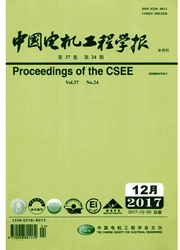

 中文摘要:
中文摘要:
首先介绍了储能变流器在光储微网系统不同运行模式下的控制策略。在并网运行模式下,针对光储微网系统中公共连接点(point of common coupling,PCC)处的电压会受到负载变化和光伏出力波动的影响,提出一种基于储能的电压管理控制策略。该控制策略可通过储能变流器的PQ控制,来维持PCC点母线电压在额定电压±10%的范围内波动,从而满足负载对电压质量的需求。当配电网发生故障或储能出力已达功率限值仍不能维持PCC点母线电压在允许范围内时,光储微网切换为孤岛运行模式,此时储能系统采用V/f控制来保证微网系统电压和频率的稳定,并联合光伏系统共同为负载供电。建立光储微网系统的仿真模型,给出变流器的控制策略以及PCC点母线电压的控制流程,仿真结果验证了提出控制策略的有效性。
 英文摘要:
英文摘要:
The paper introduced the power converter system's control strategy under the photovoltaic (PV)/battery micro-grid system's different operating modes firstly. Under the grid-connected operating mode, the voltage of micro-grid point of common coupling (PCC) may be affected by the variation in load and the fluctuation of PV output, and a power control strategy for battery system was proposed. The strategy can control the battery system's active power input and output to maintain the PCC bus voltage fluctuation within the range of ±10% of the rated voltage, to meet the loads requirements on the voltage quality. When faults took place in the distribution network or the battery system's power output had reached its limit and still can not be able to maintain bus voltage within the permit scope, the micro-grid's operation mode was switched to the island mode, and the battery system adopted the V/f control strategy to ensure a stable voltage and frequency. This paper established the simulation model of PV/battery micro-grid system, the converter's control strategy and PCC bus voltage's control process were given. The simulation results verify the effectiveness of the proposed control strategy.
 同期刊论文项目
同期刊论文项目
 同项目期刊论文
同项目期刊论文
 期刊信息
期刊信息
